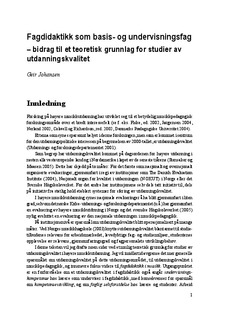| dc.contributor.author | Johansen, Geir | |
| dc.date.accessioned | 2010-03-16T14:36:06Z | |
| dc.date.issued | 2006 | |
| dc.identifier.citation | I: Nordic Research in Music Education. Yearbook Vol. 8 2006, s. 115-135 | |
| dc.identifier.isbn | 82-7853-042-4 | |
| dc.identifier.uri | http://hdl.handle.net/11250/172253 | |
| dc.description.abstract | Subject didactics as a basic and teaching subject – a contribution to theoretical foundations for studies of educational quality
Questions of educational quality have been on the general education agenda for more than twenty years. Within higher music education the quality concept have been operationalized in several ways, though little attention seems directed towards the quality of teaching and learning of the specific subjects that the students actually study. This fact, combined with an impression that the field of educational quality have been scarcely represented within music education research, are the points of departure for this article. Regarding the teaching and learning of specific subjects as a core area of educational quality, I discuss aspects of a theoretical foundation for studying this within music didactics in the german/scandinavian understanding of the word, as a part of music teacher education. My suggestion is that such studies may depart from a distinction between music didactics as a basic subject and as a teaching subject. As a basic subject, or the teachers’ knowledge base, music didactics establishes itself in relations between music and didactics, influenced by various cultural knowledge traditions. Among these, practical knowledge traditions of creating and performing music and academic traditions of education and musicology seem among the most important. Within the teaching subject, the two-part relationship between the teacher and the subject knowledge base expands to a three-part relationship between the teacher, the knowledge base and the student. This distinguishes the teaching subject by characteristics that may be analyzed in three perspectives: 1) subject internal factors, 2) the institution as context and 3) the context of society and culture. Further, it is necessary to look closer into how the teaching subject relates to the basic subject, these relations appearing as complex and dynamical. The concept of educational quality then, may be approached through how teachers can develop knowledge of relations as described, and the competence to operate within them. | en |
| dc.format.extent | 287917 bytes | |
| dc.format.mimetype | application/pdf | |
| dc.language.iso | nob | en |
| dc.publisher | Norges musikkhøgskole | en |
| dc.relation.ispartofseries | NMH-publikasjoner;2006, nr 1 | en |
| dc.relation.ispartofseries | Nordisk musikkpedagogisk forskning;Årbok 8 | |
| dc.subject | musikkdidaktikk | en |
| dc.subject | fagdidaktikk | en |
| dc.subject | subject didactics | en |
| dc.subject | educational quality | en |
| dc.title | Fagdidaktikk som basis- og undervisningsfag : bidrag til et teoretisk grunnlag for studier av utdanningskvalitet | en |
| dc.type | Academic chapter | en |
| dc.type | Peer reviewed | en |
| dc.subject.nsi | VDP::Social science: 200::Education: 280::Subject didactics: 283 | en |
| dc.subject.nsi | VDP::Humanities: 000::Musicology: 110::Music pedagogics: 114 | en |
| dc.source.pagenumber | S. 115-135 | en |
